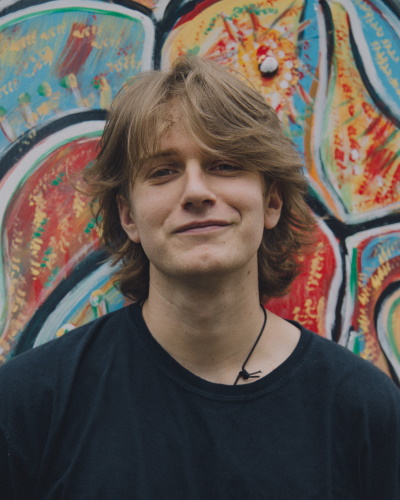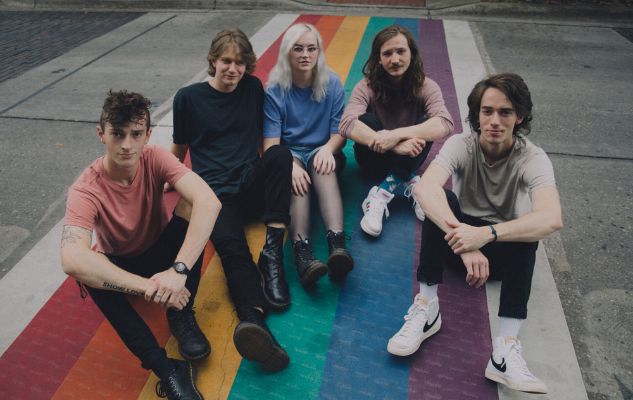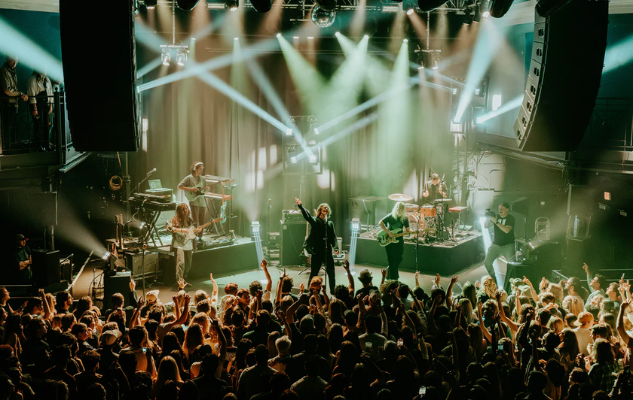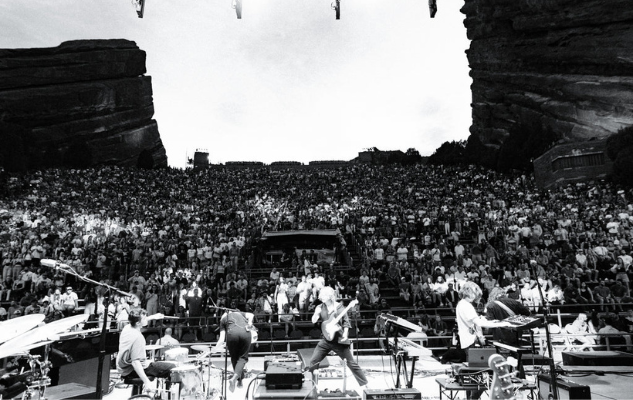Features
 Brother Dillon Basse is an alumnus of the Kappa Theta Chapter at Jacksonville University, and he is a founding member of the indie rock band Flipturn, stylized as flipturn, which was formed in 2015 in Fernandina Beach, Fla. Dillon serves as the frontman for the band providing lead vocals. He is supported by bandmates Tristan Duncan (guitar), Madeline Jarman (bass), Mitch Fountain (guitar and synthesizer), and Devon VonBalson (drums and percussion). Last year, the Fraternity interviewed Dillon for an episode of Sigma Nu Fraternity's official podcast, The Gavel Podcast. The following is a transcription of the interview. The transcription has been edited for clarity.
Brother Dillon Basse is an alumnus of the Kappa Theta Chapter at Jacksonville University, and he is a founding member of the indie rock band Flipturn, stylized as flipturn, which was formed in 2015 in Fernandina Beach, Fla. Dillon serves as the frontman for the band providing lead vocals. He is supported by bandmates Tristan Duncan (guitar), Madeline Jarman (bass), Mitch Fountain (guitar and synthesizer), and Devon VonBalson (drums and percussion). Last year, the Fraternity interviewed Dillon for an episode of Sigma Nu Fraternity's official podcast, The Gavel Podcast. The following is a transcription of the interview. The transcription has been edited for clarity.
Can you share your Sigma Nu story? We would love to hear more about why you chose to join Sigma Nu and what the Fraternity has meant to you over the years.
Dillon Basse: I can remember being convinced to come out for rush during the first few weeks that I was attending JU. Ironically, it was a member of, I think, JU’s Pike chapter who found me somewhere hanging around in the library or at one of the campus hangout spots. It was during a time when all the fraternities were recruiting and trying to invite members in, and I had the chance to meet all of them. I ended up just really, really meshing and vibing with the guys in Sigma Nu a lot more than anybody else.
Our chapter felt really unique. I don't know if other people say that about theirs, but I genuinely believe that about our chapter. We had a lot of artistic members in the chapter, and it was a small group of guys. JU's a small school, so there were maybe 30 or 40 brothers. A lot of them were dance or music majors, including my big brother in the chapter, who was a cello major. I thought that was so cool. We would jam a lot during the years I was there.
I think that really surprised me. When I first arrived at JU, I wasn't looking to join a fraternity. I'd always judged Greek life by the misconceptions and how it was portrayed in the movies. I knew that wasn’t something I was into. But then I met these dudes and was like, “Oh, okay, actually, these guys are really cool. I want to see what Sigma Nu is about.” Definitely one of the best decisions I ever made was joining the Fraternity at JU.

I imagine that a lot of artists start young and have to work very hard to get to a place where they can realize their dream of making something of their passion. How did your passion for music start? Was there a specific instrument? Did you learn on piano? Did you pick up a random instrument one day? How did it happen?
Dillon Basse: So funny enough, my first instrument wasn't piano or guitar. My mom is an Irish fiddle player, and we grew up in Massachusetts. I lived up in Mass. for about 15 years before we moved down to Florida when I was in high school. But I can remember during our time there, my mom would play gigs and host Irish sessions with all the Irish pubs around the Boston area. Even when I was a baby, she would bring me in a little baby carriage, and she'd put me under the table so no beer would spill on me or anything like that. I just grew up watching her perform. And when I was four years old, I picked up an instrument called a bodhrán, which is an Irish drum. I remember seeing that when I was little. I was like, “oh, I want to play that.” That's where I got a lot of my rhythm and musicality. Then, when I was about 12 years old, I picked up guitar, putting more melody to rhythm and harmony, and I started writing music.
And throughout high school and early college, that became my job. On the weekends with my mom, we would play gigs in Florida at bars. I didn't have a normal, I guess, high school or college job. I would go home and play gigs with my mom.
That's such an interesting relationship you have with your mom. We often hear people talk about how they complained during childhood when they felt forced to take piano or music lessons. It sounds like you enjoyed your experience.
Dillon Basse: Well, I did, but it's funny you say that. She first wanted me to play the violin. So, I did start on that, and we did have that initial, "I don't want to play that" back and forth. Ultimately, that's what led me to pick up the bodhrán and the guitar because they were something that I chose and wanted to learn. Though I wasn't playing the instrument she played, we could still play together and share a connection in music.
As a musician, do you think having grown up around Irish music influenced your sound or how you play?
Dillon Basse: I definitely think it influenced how I play guitar and rhythm guitar especially. It’s funny, the first time that any of my band members saw me bring out the bodhrán, they were like, "That's the missing link. That's it. That explains so much of how you play.” But yeah, I think everybody has their own way of finding their style. That was mine.
Can you tell us how the band came to be?
Dillon Basse: Two members of the band, Madeline and Tristan, had been friends since early elementary or middle school. Initially, we were in some classes together. We weren’t close, but since it was a small school, everybody who played music or was really interested in music knew each other.
I remember one day, I got a phone call from Madeline asking if I was interested in jamming with her and Tristan and if I might want to join them in starting a band. I ultimately thought it would just be something to do for fun. An opportunity to play with people my own age. Then, one thing led to another, and we were like, "Wouldn't it be funny if we recorded music and put it on iTunes or Spotify? Wouldn't that be crazy?" And yeah, that's pretty much how it started.
Where does the name flipturn come from?
Dillon Basse: I think that one of the hardest things when you're first starting a band is deciding what you will call yourself. We tried a few things very early, but nothing seemed to fit. Then Madeline's parents came up with the suggestion for flipturn. Madeline was a swimmer in high school, and they were like, "What about flipturn because you're a swimmer? The move you do at the end of the pool." We liked the suggestion and looked it up on Spotify to see if it had been taken. We saw that it was free and were like, "We're going to run with that."

Can you share more about the experience of going from "Wouldn't it be crazy if we put something up on Spotify," to now you're playing major venues and touring the country?
Dillon Basse: It's all been super gradual. When we first started, we were the stereotypical garage band. We literally practiced in Madeline's parent’s garage, and we started out covering songs because we didn't have anything original. Then, we started experimenting with writing our own music.
I remember we had our first ticketed show in Gainesville, Fla., at this venue called High Dive. This was the summer going into our freshman year of college. I have no idea to this day how we got that gig or even how they found us. I think maybe Madeline had connected with them on Facebook. But we got a DM from whoever was booking their shows. We had put a cover video on Facebook that they must have seen and liked. When you have never played a show before, it's hard to go to even small venues and ask, "Can we play a show here?" Most of the time they'll say "No," unless you can show that you can bring people in. So, it was a shock when they asked, "Hey, would you want to come open for another band touring through the area?" We were like, "Yeah, of course!" And we played that show for maybe 40 of our combined good friends.
I remember how I felt after the show was over. I had never felt anything like that before. The feeling of performing to a crowd with all your original music alongside your friends. It was something else.
I can remember that was the moment when I was like, "This is what I want to pursue. This is what I want to do.” And everybody in the band was like, "Yeah, this is sick. This is what we're going to put our effort into."
Then, slowly, we got to play more gigs and put out more of our original music. And we started to grow a following between Gainesville and Jacksonville.
At a lot of the shows, my chapter brothers from JU would come, even making the two-hour trek to Gainesville. They were the life of the crowd for some of those shows too, because they were so excited and would tell others about us. So many of my connections and people in my life today can be traced back to some of my brothers telling people about my music. It's really cool how it expands that way and people you can trace it all back to, honestly.
Obviously, I’ve stopped dropping information about our shows in the group chat because we have a lot going on, but even now, they still come out to support us. We played a show a week ago, and sometimes they won't even tell me they're coming. I'll just see them now in the crowd and connect with them after the show.
What's next for flipturn?
Dillon Basse: In 2022, we released our first full-length album. There's about 14 songs on it. It's called Shadowglow. And as a band, we've been touring for about four or five years now. It's mostly just been Florida or Southeast stuff until two or three years ago. That's when we started pushing out to California and hit everywhere that we could. The first tour we were ever going on was a cross-country tour scheduled in early 2020. We were so excited. We had four or five shows heading into Texas, and we're like, "This is so cool. We're going to tour the whole country. This is amazing.” And then COVID happened. Because of that, we returned home and had a lot of time to write. So, we were just writing the album for 2020 and a lot of 2021. And in 2022, we put it out. And then, for the last three years, we've just been non-stop touring every spring, summer, and fall. Now we're in the process of hunkering down trying to write and record our next album. Hopefully, next year, don't quote me on this, but we're going to try to start putting out some new music.
Editor’s Note: This interview was recorded on January 17, 2024. On January 24, 2025, flipturn released their second studio album Burnout Days.
